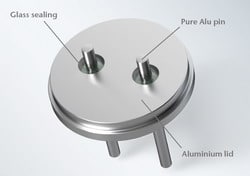source: Schott news
New leak-tight lid technology will open a wealth of design opportunities for supercapacitors and electric double-layer capacitors, enabling higher capacitance and temperature resistance.
As electric devices and systems continue to develop in today’s world, aluminium electrolyte capacitors are becoming increasingly sought after due to their important electrical storage roles in these applications. Electric vehicles, high-power systems, renewable energy, defense & aerospace, and heavy industry all rely on aluminium electrolyte capacitors to meet demanding power needs, with increasing technical requirements for capacitors to deliver high-level performance.
While efficient and reliable, the performance of aluminium electrolyte capacitors is often limited by the design and materials used for the capacitor’s housing. Imperfect terminal seals, for example, can allow moisture permeation, leading to electrolyte dry-out and deterioration in performance over time. To counteract these performance losses, oversized or even multiple capacitors are utilized – a necessary but less than ideal solution for cost and space management purposes.
A pioneering development for capacitors
SCHOTT Electronic Packaging in Landshut, Germany, a division of international technology group SCHOTT AG, has developed a pioneering solution to mitigate electrolyte dry-out in capacitors for long-term and reliable high-level performance. Drawing on over 75 years of experience in glass-to-metal sealing (GTMS), SCHOTT is now introducing new capabilities to produce glass-to-aluminium (GTAS®) seals – the first of its kind.
Polymer materials are often used to seal capacitor terminals. The organic nature of polymers makes them susceptible to deterioration to a brittle state over time, resulting in loss of gas-tightness. Moisture is then able to permeate the compromised polymer seal, which causes electrolyte evaporation and significant losses in power capacity.
The benefits of reliably gas-tight hermetic seals
The solution to electrolyte leakage lies in the capacitor lids. Helmut Hartl, Head of R&D at SCHOTT in Landshut, Germany, explains the benefits of utilizing GTAS technology for capacitors: “By replacing seals made from polymers or other organic compounds with specialty glass materials, capacitor terminals can be hermetically sealed into the aluminium lids. Creating a completely gas-tight glass-to-aluminium sealed barrier at the pin seal points protects the capacitor from moisture intrusion, eliminating the potential for electrolyte dry-out.”
In addition to unprecedented support for capacitor reliability and longevity, GTAS technology offers nearly boundless customization possibilities. The leak-tight, glass-sealed lids are suitable for a wide range of applications, including radial, axial, snap-in, supercapacitors, and electric double-layer types – all in both small and large can sizes.
Capabilities to withstand challenging conditions
As a standard in many harsh environment, safety-critical applications for decades, hermetic glass seals offer a host of benefits beyond the prevention of electrolyte loss in aluminium capacitors. Glass-to-metal seals are capable of withstanding environments with temperatures of -40oC to +150oC without issue, and in some cases even farther beyond such a range. The leak-tight nature of glass seals allows for the development of standard size or even smaller units with much higher capacitance. This benefit also results in an increase in both shelf life and overall longevity of the capacitor.
Mr Hartl shares his outlook on GTAS technology for capacitors: “This is an exciting period for capacitor development. We see every day the continued growth of next-generation power applications that rely on them, including electric vehicles and renewable energy sources. GTAS technology comes at a perfect time to support even more reliable, long-lasting electrical storage performance in sectors shaping the future of our day-to-day lives.”
